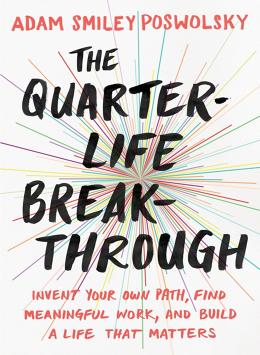Full-Time Jobs Can Cheat Entry-Level Workers–Here’s An Alternative
Despite what some hiring managers might tell you, many entry-level jobs simply don’t come with real opportunities for learning and growth. That makes it hard to stay interested in a position when you’ve learned everything there is to know about the role after two months.
As a result, many recent grads spend their first few months or years in the workforce job-hopping from one full-time role to the next, but only staying in each one for a short while. In the process, the conventional wisdom goes, they do serious damage to their resumes right when it’s supposedly crucial to start their careers off on the right foot.
But what if the conventional wisdom is dead wrong?
What I Didn’t Learn Guarding A Parked Truck
Six months after graduating from college, when I moved to New York City to do freelance work in the film industry, I took any job I could get. For a few months I worked as a production assistant (or “PA”) on several different films. For one gig, my job was to sit on the back of the grip and electric truck, and make sure no one who wasn’t part of the crew took anything (like lights or cables) from the truck.
For 12 hours a day, six days straight, in 20-degree weather, I sat on the back of that truck near Bryant Park and froze my butt off for $100 a day. Since the truck was a few blocks away from the set, I didn’t learn anything about film production. I just sat there. I barely interacted with anyone, except for a few grips who chain-smoked all day and a few tourists who wandered by, asking if anyone famous was in the movie.
On my next gig, I worked for just $50 a day as a PA on a small, independent film but told the line producer I didn’t want to watch a truck, I wanted to be on set. Because the film was a low-budget project, they were highly understaffed, and I ended becoming the assistant location manager, helping the location manager and the line producer scout new locations and manage on-set logistics for the film. I saw firsthand how involved making a movie really is.
While I got paid half as much, the experience of being an apprentice on set taught me infinitely more than making $100 a day guarding a truck. Two months later, my location manager brought me onto another gig as her assistant location manager and paid me $200 a day. After that, I worked for nearly two years doing freelance location work. I learned so much that after two years of freelancing, I produced a short film about a day in the life of two Iraq War veterans struggling with post-traumatic stress disorder. Taking the skills I’d learned on various film sets, I managed a cast and crew of over 40 people, something I never would have been able to do had I not turned the experience of getting frostbite on my toes into an opportunity for an apprenticeship.
What You Really Need From Entry-Level Work
The whole point of entry-level work is to offer you experience you can build on—in other words, mentorship and apprenticeship. You need to learn from someone with expertise, someone with at least five more years of experience than you. You don’t want day 154 of your job to be the exact same as day one; you want to learn something new every day. And if a full-time role doesn’t offer you that, it probably isn’t worth taking.
The alternative may actually prove better for your early career. Short-term entry-level experiences allow you to quickly test assumptions about your career interests. In the same way companies use rapid prototyping to test new products and gain immediate user feedback, you can challenge your assumptions about how you might spend your days.

One of the pioneers of rapid prototyping in Silicon Valley is Tom Chi, who served as head of experience at Google X, and previously worked for Yahoo and Microsoft. Tom and his colleagues came up with the first working prototype for the Google Glass using a coat hanger and a sheet protector that fourth graders use for book reports. It took them only one day—actually, 45 minutes. Tom believes corporate cultures often stifle innovation. Decisions are not made by actually testing assumptions, but rather on ego. The person with the highest salary in the room usually gets to make all the decisions, even if that person doesn’t have the best ideas.
Tom has been an astrophysics researcher (starting at the age of 15) and a Fortune 500 consultant, and he’s also built software and hardware used by millions of people and has scaled social enterprises in the developing world. Rather than guess what his life purpose might be, he is more focused on being a lifelong learner. Tom’s mantra is to “maximize the rate of learning by minimizing the rate of time to try ideas.” Rapid prototyping is all about learning as much as possible, as quickly as possible. People often spend days, months, even years talking about the changes they want to make. Stop talking. Start doing.
Your Career Experiment Has No End Date
Treat your career like a lifelong experiment. Don’t worry about finding the right answer; spend more time asking the right questions. Try new things, test assumptions, see what works for you, and learn what doesn’t. And yes: If that means “job hopping,” job hop! Realizing that a specific job or sector or working environment is not the right fit for you is not failure—it’s essential data that will help you find meaning and fulfillment in the future.
If you’re new to a field, look for short-term, entry-level experiences in the form of apprenticeships, consulting opportunities, internships, or freelance gigs that actually let you learn something. While these experiences may pay less, they are much more valuable than full-time entry-level jobs where you do something you already know how to do (like sit in the freezing cold to watch a truck, answer a phone, or schedule meetings). The best thing about short-term experiences is that if they aren’t the right fit, you can easily move on to something else.
You won’t find many short-term entry-level experiences like these advertised on websites or job boards, though. You may have to create one for yourself. If you’re having trouble coming up with an idea for an apprenticeship, check out the Leap Year Project, created by Victor Saad.
Interested in going to business school but worried about the cost, Victor created a self-directed, multi-city master’s degree in design, business development, and social innovation. He developed 12 different experiences in 12 months for himself, apprenticing with places like a leading architecture firm in Seattle, an art and apparel community in Chicago, and a digital agency in San Diego. Inspired by his leap year, he decided to create an actual school for others to learn by doing, called Experience Institute.
Remember, it’s possible to create any kind of short-term apprenticeship that makes sense for you. If an opportunity doesn’t do more than just let you “get your foot in the door,” it’s probably not much of an opportunity in the first place.
This article is adapted from The Quarter-Life Breakthrough: Invent Your Own Path, Find Meaningful Work, and Build a Life That Matters by Adam Smiley Poswolsky. © 2016 by Adam S. Poswolsky. TarcherPerigee, an imprint of Penguin Random House LLC. It is reprinted with permission.
Fast Company , Read Full Story
(111)














